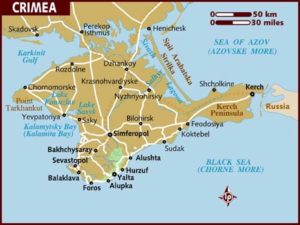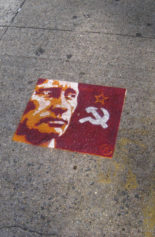
Last ditch diplomatic talks in London between Secretary of State John Kerry and his Russian counterpart, Foreign Minister Sergey Lavrov, appeared to yield little progress, as Lavrov declined to predict what would happen if the referendum passed. But Lavrov told reporters Russia would respect the results of the Crimea vote.
“We lack a common vision of the situation, and differences remain,” Lavrov said of his Ukraine negotiations with Kerry, according to the Associated Press.
Despite the presence of thousands of Russian troops massed near Ukraine’s eastern border, Lavrov said Moscow has no plans to invade southeast regions in Ukraine.
In his comments to the press, Kerry urged Russia’s parliament against accepting any offer to claim Crimea as its own.
“We believe that a decision to move forward by Russia to ratify that vote officially within the Duma would, in fact, be a backdoor annexation of Crimea,” Kerry told reporters in London.
Kerry asked Moscow to support broad autonomy for Crimea as a part of the Ukraine. He predicted the probability of “if the people of Crimea vote overwhelmingly, as one suspects they will, to affiliate or be associated with Russia.”
With 2 million people, the peninsula of Crimea juts out into the Black Sea and has a majority ethnic Russian population. It is also the site of a large Russian naval base. While the West and Ukraine’s new government in Kiev believe the region’s vote to secede is unconstitutional, Moscow doesn’t recognize leaders in Kiev as legitimate after they forced Ukraine’s pro-Russian president from power last month.
The Ukraine is divided between western Ukraine favoring ties with the 28-nation European Union and eastern Ukraine having closer economic and traditional ties to Russia.
While no one in the West has mentioned military force to keep Russian President Vladimir Putin in check, Western leaders have instead relied on the threat of harsh sanctions against Russian officials and businesses.
“If the referendum takes place, there will be some sanctions,” Kerry said. “There’ll be some response.”
Kerry told a congressional hearing earlier in the week that a “serious series of steps” would be taken against Russia if the Crimean referendum passes on Sunday. Those steps include suspending preparations for the G8 Summit in Sochi; suspending talks on Russia joining the Organization for Economic Cooperation and Development; and suspending visa and investment talks between Russia and the European Union.
British Prime Minister David Cameron repeated the sanctions threat, telling Kerry, “We want to see Ukrainians and the Russians talking to each other. And if they don’t, then there are going to have to be consequences.”
But Lavrov had his own response to the threat of sanctions—one more grounded in reality.
“Our partners also realize that sanctions are counterproductive,” he said, because they make Russia even more entrenched.
While in Kiev yesterday, U.S. Sen. John McCain said he would help send an array of armaments, ranging from combat infantry rifles to anti-tank weapons, to Ukraine as quickly as possible. Ukraine’s military is poorly trained, but McCain said the presence of Russian troops was enough reason to help the country defend itself.
“Would you like them to throw rocks?” said McCain. “If that’s what they’re literally begging for, why should we judge whether we give it to them or not?”
Ukrainian Prime Minister Arseniy Yatsenyuk apparently is willing to give Crimea nearly unparalleled latitude in governing itself, while working to resolve concerns with Kiev over taxes and language differences.


